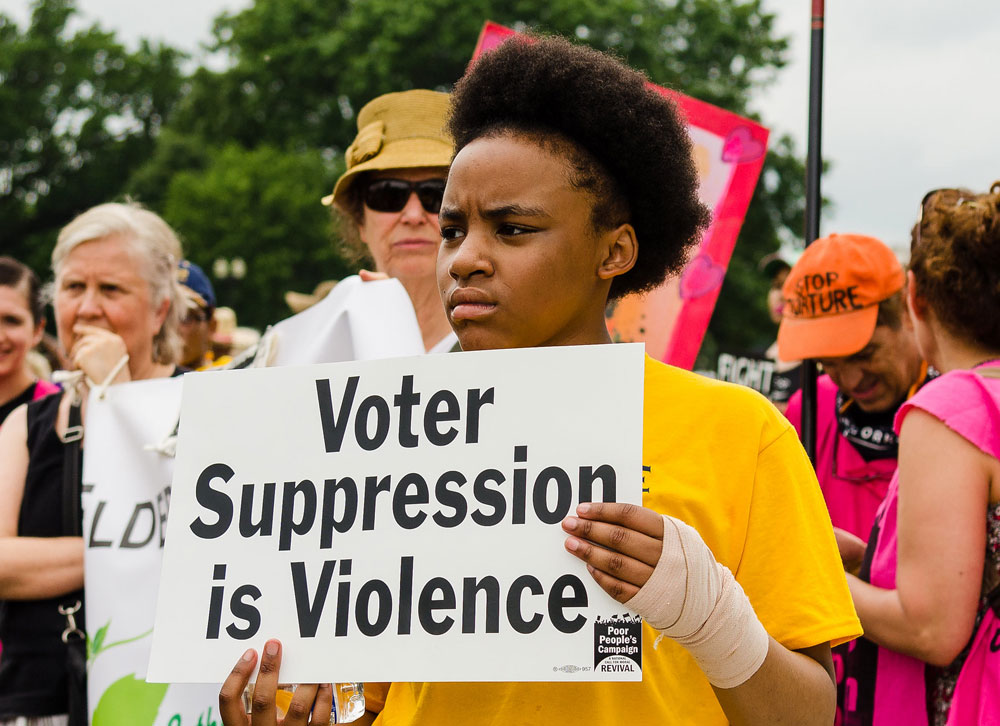
The success of voting by mail, early voting, the use of drop boxes, and other voter engagement processes during the 2020 elections was seen in the voter turnout numbers. The 66.3 percent turnout rate (compared to 60.1 percent in 2016) was the highest seen in a US presidential election in 120 years. While many worked hard to help get out the vote and make sure every vote counted, others pushed back, using the courts to fight each new effort to ease voting during the pandemic and to keep voters, especially voters of color, from making their voices heard.
Changing the rules seems to be the ideology of many Republican-led legislatures in states Joe Biden carried in the presidential election. As quickly as they can come back into session, legislators are introducing bills to restrain voting. It’s not much of a surprise that the states most active in this effort include Arizona, Georgia, Texas, Pennsylvania, Michigan, and Wisconsin, with others expected to follow. Even states where Donald Trump held sway are looking at their election processes and considering measures to impede voting by people of color, seniors, youth, or new voters.
The clear target in Arizona is voting by mail. More than 3.4 million ballots were cast in the state during the 2020 election—and the majority of voters are on a Permanent Early Voter List (PEVL) and voted by mail. Republicans have introduced bills that would purge voters from the PEVL if they have not voted in both the primary and the general election for two straight cycles. Another bill would require all vote-by-mail ballots be notarized; this is no simple matter, since notaries can be few and far between.
Arizona Democrats call both measures voter suppression. PEVL voting is “the preferable method of voting for 80 percent of Arizona voters,” says State Representative Athena Salman of Tempe. “To see Republicans do this power grab after the highest voter turnout elections in our state’s history, in the shadows of an attempt to overthrow the election results in Arizona…there’s no other way to describe this than as a flat-out power grab.”
In Pennsylvania, another battleground state, the issues before the state legislature are voter ID laws and no-excuse mail-in voting. Pennsylvania has 14 pending proposals for new voter restrictions—the most in the country. But, unlike Arizona, which has a Republican legislature and governor, Pennsylvania has a Democratic governor who can veto these bills. The push for an override will not be simple.
Sign up for our free newsletters
Subscribe to NPQ's newsletters to have our top stories delivered directly to your inbox.
By signing up, you agree to our privacy policy and terms of use, and to receive messages from NPQ and our partners.
In Georgia, the state that held the attention of the nation as its voters determined the direction of the US Senate, the state legislature is focused on voter ID. They might also eliminate the “no-excuses” absentee ballots as well, since they were very popular in this past election. We should remember that Georgia’s secretary of state staunchly defended his state’s election practices when Trump accused him of fraud—but that was then, and this is now. Georgia, like Arizona, has Republican leadership in its statehouse and in its governor’s mansion. Passage of new voter suppression laws may not be difficult.
Writing for the Guardian, Sam Levine points out that there are 106 bills pending in 28 states that would limit access to voting. Compared to last year, when there were 35 restrictive bills across 15 states, that is quite a jump. The impact of the 2020 election seems to have pushed quite a few buttons in state legislatures. The Brennan Center for Justice has done a deep dive into this area and shared its findings in their 2021 Voting Laws Roundup. One third of the pending bills would place new restrictions on voting-by-mail; others would limit same-day voter registration, which has been a major boon in voter turnout. On the flip side, there are also 406 pending bills that would expand voting access across 35 states, including Texas, Mississippi, and Missouri.
With all of this pending legislation, it’s likely but not certain that some will make it to the desks of governors and become law. However, once signed, new laws may also be challenged in state and federal courts. For example, a 2018 voter ID amendment in North Carolina was blocked from taking effect in the 2020 election cycle by a federal judge. That ongoing legal battle continues at the state and local level; it could be settled in time to apply to the 2022 midterm elections.
The issues at play in the upswell of voter suppression laws following the 2020 election are both clear and disheartening. Myrna Pérez, director of the voting rights and elections program at the Brennan Center, describes the surge in anti-voting legislation as “counter-sensical.” She says, “The volume of anti-voter legislation is certainly revealing that a nerve was struck. There are certainly people who are sensitive to the idea of more progress…it ultimately comes down to an anxiety over the browning of America and people in power are afraid of losing their position.”
The right to vote is sacrosanct for many in the US. People have marched, protested, fought, and even died to secure it. It must be a superpower, or why else would so many work so hard to either protect or suppress it?—Carole Levine










